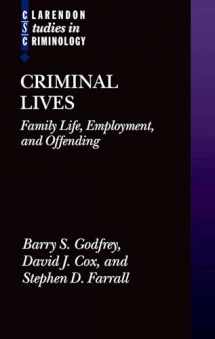
Criminal Lives: Family life, Employment, and Offending (Clarendon Studies in Criminology)
ISBN-13:
9780199217205
ISBN-10:
0199217203
Edition:
1
Author:
Stephen Farrall, David J. Cox, Barry S. Godfrey
Publication date:
2007
Publisher:
Oxford University Press
Format:
Hardcover
234 pages
FREE US shipping
Book details
ISBN-13:
9780199217205
ISBN-10:
0199217203
Edition:
1
Author:
Stephen Farrall, David J. Cox, Barry S. Godfrey
Publication date:
2007
Publisher:
Oxford University Press
Format:
Hardcover
234 pages
Summary
Criminal Lives: Family life, Employment, and Offending (Clarendon Studies in Criminology) (ISBN-13: 9780199217205 and ISBN-10: 0199217203), written by authors
Stephen Farrall, David J. Cox, Barry S. Godfrey, was published by Oxford University Press in 2007.
With an overall rating of 3.6 stars, it's a notable title among other
books. You can easily purchase or rent Criminal Lives: Family life, Employment, and Offending (Clarendon Studies in Criminology) (Hardcover) from BooksRun,
along with many other new and used
books
and textbooks.
And, if you're looking to sell your copy, our current buyback offer is $0.3.
Description
There is currently a huge growth of interest in histories of crime, and intellectual conversations and connections between historians and criminologists are becoming much more frequent. However, published work which uses historical data to this extent is rare. Criminal Lives uses historical data to directly address modern criminological debates and engages a wide audience in a genuinely interdisciplinary analysis.This book addresses a number of important questions about offenders' persistence in, or distance from, crime and questions the current theoretical frameworks that are given to explain why some people stop, or slow down, their offending, and why offenders' children become involved in crime. By using criminal registers, census material, and newspaper reports from 1880 -1940 for one industrial town in North-West England, this book asks how and why did some people stop offending, what part did employment, relationship formation, and family responsibility play in that process; was criminality passed on from parent to child, and if so, how; and to what extent were persistent offenders also persistent victims?


We would LOVE it if you could help us and other readers by reviewing the book
Book review

Congratulations! We have received your book review.
{user}
{createdAt}
by {truncated_author}


